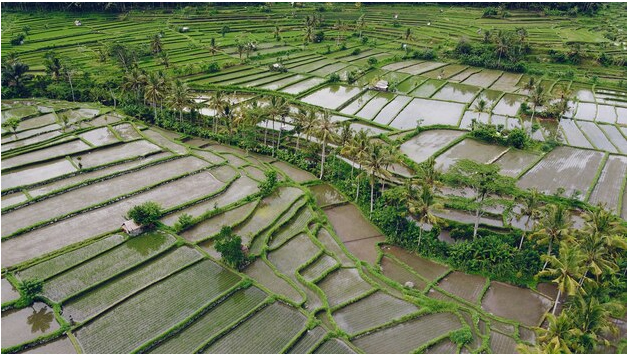“Preserving Valencia’s Water; Empowering Farmers with Organic Fertilizers for Pollution Free Aquifers”.

Valencia, a beautifully calm city in Spain confronts a significant environmental challenge, as the very aquifers sustaining its landscapes face contamination from inorganic fertilizers.
There are problems that farmers face with the excessive use of inorganic fertilizers that are causing much trouble in the environment, as well as water aquifers.
Current Situation
Agriculture in Valencia (Spain) depends on the amount of nitrogen fertilizers, which contributes to high concentrations of nitrates in public drinking water. Chemicals contribute to the accumulation of nitrates in underground aquifers. High levels of nitrates in drinking water increase mortality from cancer, especially stomach and prostate cancer. This highlights the alarming impact of inorganic fertilizers on water quality and public health in the region.
Impact of Inorganic Fertilizers on Environment
The impact of inorganic fertilizers on the environment includes soil degradation, water pollution, and contribution to greenhouse gas emissions. More usage may lead to nutrient runoff, affecting water quality and aquatic ecosystems. Certain components in these fertilizers can be harmful to soil acidification, potentially harming plant and microbial life. These environmental challenges require careful management to solve negative effects of inorganic fertilizers in agriculture.
Impact on Water Quality
In Valencia, the use of inorganic fertilizers has led to significant water quality issues. Outdated farm practices, marked by excessive fertilizer use, traditional irrigation, and pesticide usage, contribute to surface and groundwater contamination in the region. Specifically, this impact manifests in nutrient, chemical, pathogen, and sediment release. Excessive losses of phosphorus and nitrogen emerge as key concerns, emphasizing the urgent need for a shift towards more sustainable agricultural practices in Valencia to safeguard water resources.
Good news!
Interview with Adnan Ali ( who studied in the University of polytechnic Valencia in 2022/23 and is currently enrolled in the University of padova italy doing his masters on agriculture) In response to the issue of water pollution in Valencia, Spain, Adnan Ali explained that the government has implemented a 50% ban on the usage of inorganic fertilizers. According to Adnan Ali, there are plans for a comprehensive prohibition, reaching 100%, within the next 5 to 6 years. As Valencia grapples with the consequences of inorganic fertilizer use, these governmental initiatives signify a crucial step toward a sustainable and healthier environment.
Fostering Sustainable Agriculture through Mindful Organic Contributions
Organic farming methods offer several advantages over conventional farming. Firstly, organic farmers typically require less start-up debt and smaller loans compared to conventional farmers, as they do not rely on expensive chemical inputs. This not only reduces financial burdens but also promotes sustainable practices. Additionally, organic farming has been found to be more successful in a shorter amount of time. Similar to inorganic fertilizers, organic fertilizers enhance crop growth, but without the use of harsh chemicals. This approach not only benefits the crops but also contributes to the preservation of biodiversity, creating a healthier and more balanced ecosystem.
There are so many organic fertilizers that are very sustainable.
Organic fertilizers
Compost
Made from kitchen scraps and yard waste, compost is a rich, natural fertilizer that enhances soil structure and nutrient content.
Manure
Animal manure, such as cow or chicken manure, is a readily available organic fertilizer that provides essential nutrients to plants.
Bone Meal
Ground animal bones create a slow-release fertilizer rich in phosphorus, promoting strong root development.
Fish Emulsion
This liquid fertilizer, derived from fish remains, is a quick-acting source of nutrients, especially nitrogen.
Coffee Grounds
Used coffee grounds are a simple way to add nitrogen to the soil, benefiting plants like tomatoes and roses.
These organic options are user-friendly and contribute to soil health and plant growth in a natural, sustainable manner.
In conclusion, organic fertilizers offer numerous benefits to both farmers and the environment. By avoiding the use of harsh chemicals, organic farming methods promote healthier soil, biodiversity, and overall ecosystem balance. Organic fertilizers not only boost crop growth but also contribute to sustainable agricultural practices. However this does not mean that we should entirely cut out the inorganic use of fertilizer because it is not the inorganic fertilizers that cause most harm, it is how we use them. If farmers use inorganic fertilizers as much as organic fertilizers would make a huge improvement. It is all about balancing out.
As individuals, we can play a role in supporting organic farming by composting or mulching ( chipped woodpieces) or any organic waste you have and sharing it with fellow farmers. By doing so, we can contribute to the growth of organic farming improving the current situation into a more sustainable and environmentally friendly agricultural system.
“In regards of our agricultural initiative at the American College Innovation Lab was a great success. An Article made by the students of the American College innovation lab called; Angelina Oehri, Muhammad Haris Mahmud’s and Sofia Roifman.”
Comments (0)
This post does not have any comments. Be the first to leave a comment below.
Featured Product

